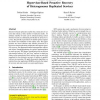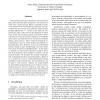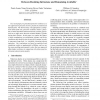131
click to vote
TPDS
2010
14 years 8 months ago
2010
In the past, some research has been done on how to use proactive recovery to build intrusion-tolerant replicated systems that are resilient to any number of faults, as long as reco...
139
click to vote
SICHERHEIT
2010
14 years 12 months ago
2010
Intrusion-tolerant replication enables the construction of systems that tolerate a finite number of malicious faults. An arbitrary number of faults can be tolerated during system ...
101
click to vote
CORR
2008
Springer
15 years 2 months ago
2008
Springer
In this paper, we describe a proactive recovery scheme based on service migration for long-running Byzantine fault tolerant systems. Proactive recovery is an essential method for ...
109
click to vote
DSN
2004
IEEE
15 years 5 months ago
2004
IEEE
Unanticipated runtime events, such as faults, can lead to missed deadlines in real-time systems. While it is not always possible to know when a fault will occur, we can sometimes ...
103
click to vote
DSN
2005
IEEE
15 years 7 months ago
2005
IEEE
Fault-tolerant protocols, asynchronous and synchronous alike, make stationary fault assumptions: only a fraction f of the total n nodes may fail. Whilst a synchronous protocol is ...
129
click to vote
SAC
2006
ACM
15 years 8 months ago
2006
ACM
In a recent work, we have shown that it is not possible to dependably build any type of distributed f fault or intrusiontolerant system under the asynchronous model. This result f...
110
click to vote
SRDS
2006
IEEE
15 years 8 months ago
2006
IEEE
In a recent paper, we presented proactive resilience as a new approach to proactive recovery, based on architectural hybridization. We showed that, with appropriate assumptions ab...



